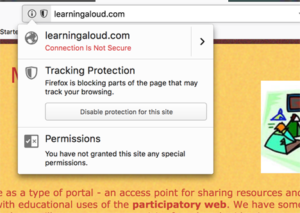Internet companies are all fighting for a niche. In doing so, they collectively represent a great example of the tragedy of the commons. The combined consequence of serving their individual personal interests may end up destroying the shared opportunity that is the Internet. This will be a long post, but I promise to try to bring all of the topics together at the end.
FireFox (and Apple Safari) have found their niches by offering users security. Taking advantage of recent legitimate user concerns related to privacy, the newest Mozilla FireFox browser offers a technique for blocking cookies and as one consequence avoiding the display of one technique for displaying targeted ads. This technique can be fine-tuned by the user, but comes with the cookie blocking feature turned on. There are several ways to tune this capability, but the easiest approach is just to use FireFox as is.
Here is a very brief tutorial that should be sufficient to use the most basic capabilities. Remember the default is to block cookies. There may be situations in which this is an issue. It is unlikely you want targeted ads, but you may be other services you want that do take advantage of cookies. To the left of the address bar, you should see a shield and an i within a circle. Selecting this area of the browser should reveal a drop-down menu. One of the options allows you to turn “tracking protection” on (or off again).
Just to be clear, ads and cookies can be related or independent “problems”. Cookies offer the mechanism allowing targeted ads. The cookies allow the collection of information about your online behavior and this information can be used to provide you ads suited to your interests. You probably recognize this method as the method by which Google sells ads (to those willing to purchase them) and provides you ads you might find useful. It is also one method by which other companies collect information about you. You could allow Google to set cookies and block others, but who wants to learn how to do this or to take the time.
Ads do not require the use of cookies to collect information. As an example likely to be familiar to my readers, the site FreeTech4Teachers displays multiple banner ads alongside the entire blog. These are not targeted ads in the way Google ads are targeted and visitors all see the same collection of ads. The ads are assumed to be of interest to educators, but are only targeted in the way specialty magazines or television programs offer ads based on their audience. Turning cookies off will not prevent the display of these ads. To explain in a simple way, these ads are simply images that serve as links to the companies promoted. You can’t really turn this off because using images as links is basic HTML and serves may other functions on other sites.
The issue I would like to point out here is related to the need for content producers (anyone who wants to use ads to support the effort to provide content) and service providers (the companies who offer a free service in return for potential ad revenue) to generate revenue. Google makes a lot of money, but also pays many individuals and has many infrastructure expenses. Google supports its need for revenue by targeted ads (which depend on cookies). Some content providers take the same approach and addition rely on users to offer free content (e.g., Facebook).
Two things could happen if everyone would block cookies:
- Companies such as Google would have to attempt to develop countermeasures (not provide services to users unwilling to accept cookies), or
- Go out of business.
Countermeasures are easier to implement than you might think. For example, I could add a small segment of code in the header to this site that would determine the browser requesting access and refer the user to a different page if the browser was Mozilla Firefox. This second page might ask that anyone wanting to view the content on the first page access this information using Chrome. I am certain that the Google coders could come up with techniques that are far more sophisticated.
At present, Google is not likely to do this type of thing because FireFox has such a small share of the market. If FireFox had Chrome’s share of the market, Google would have to try something to protect its business model.
I don’t know where this is all going. There is no free, only different ways to pay. My long-term predictions would be a move to micropayments. This would be a system by which users would have to set up an account and the money in this account would be drawn on depending on what they viewed. New companies would serve as intermediaries to provide this service (something like a credit card company). The cost per page would be very small (a cent or so), but this is pretty much what Google generates through its present ad model. The cost could vary from site to site and some would probably be free. Imagine reading anything you wanted from the New York Times for a few cents per article. There would be no need for a subscription to the entire information source. Sites attempting to sell you things (e.g., Amazon) would be free because that service would have another way of generating income.
![]()

You must be logged in to post a comment.